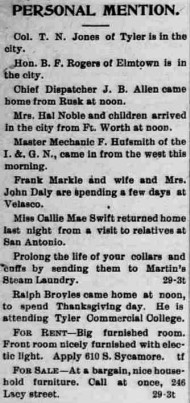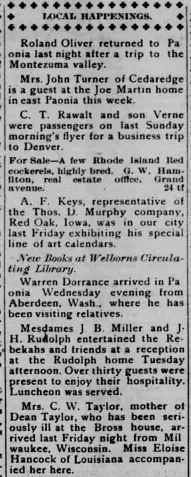
In the late 19th and early 20th centuries, local newspapers published “Personal Mention” or “Local Happenings” columns — the community’s version of Facebook status updates. Reporters (and often readers themselves) submitted short notes about who was visiting whom, who returned from a trip, or who entertained guests for Sunday dinner.
A single column could mention dozens of names in just a few inches of space — all rich with genealogical clues.
What to Look For
Personal Mention notes often include:
- Full names or initials of individuals, sometimes paired with relationships (“Mrs. C. W. Allen and daughter visited her sister Mrs. George Reed”).
- Residences and travel details — “from Chicago,” “formerly of this city,” “moving to Kansas City.”
- Occupations and employers noted in passing (“John D. Baker, telegraph operator at the depot, left for St. Louis”).
- Social and family networks, revealing maiden names and intermarried families.
- Health updates or local gossip that point to later obituaries or moves.
Why It Matters
These snippets may seem trivial, but together they recreate the rhythm of community life — tracing your ancestor’s daily movements, friends, and relatives. They can bridge gaps between censuses, confirm identity when multiple people share a name, and reveal migration patterns.
In small towns, the same families appear repeatedly — allowing you to follow their stories year by year through the most ordinary moments: who visited, who hosted, and who was “pleasantly surprised” by a caller from out of town.
Genealogical Takeaway
Search with flexible combinations:
“Personal Mention” + surname“Local Happenings” + surname“People and Events” + surname“Neighborhood News” + surname
When you find one entry, browse the full column — you may spot in-laws, neighbors, or future spouses mentioned nearby.
Examples:


